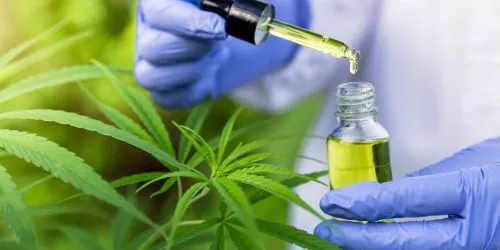
CBD is a compound found in the hemp plant. It’s one of over 120 phytocannabinoids, but unlike THC, CBD is non-psychoactive so it doesn’t cause a “high.” CBD works with the ECS (a natural cell signalling system in your body whose function is to keep your body balanced or in “homeostasis”) and regulates many of your body functions, including sleep, pain, stress and mood, among others.
Professor Mike Barnes
Consultant Neurologist
What is CBD?
CBD, or Cannabidiol, is a naturally occurring compound found in the hemp plant (Cannabis Sativa). Unlike tetrahydrocannabinol (THC), another compound found in cannabis plants, CBD does not produce a psychoactive effect, which means it does not cause a “high”.
CBD has been gaining popularity in recent years as a food supplement and ingredient in topical products such as creams and balms. In parallel to this, there has been a significant increase in medical research studies and clinic trials looking at the therapeutic effects of CBD. It is estimated that 25% of adults in the UK and USA have now tried CBD.

CBD statistics
- In the UK, approximately 1.3 million people in the UK use CBD products regularly.
- Over 6 million individuals have tried a CBD product within the past year
- Product quality with 40% of respondents, is pivotal in their decision-making process
- The UK is the 2nd biggest CBD market after North America.
- The CBD skincare market is growing at over 22% per year.
Sources: YouGov Consumer Preferences-
The Endo-cannabinoid System (ECS)
The endocannabinoid system, often called the ECS, is a unique network within the body that helps balance essential functions like mood, sleep, appetite, and immune response. This system has three main components that work together to keep the body in balance, even under stress.
First, there are endocannabinoids, which are natural compounds produced by the body that act similarly to cannabinoids like CBD, found in cannabis or hemp plants. Then, there are cannabinoid receptors, called CB1 and CB2, located throughout the body. CB1 receptors are primarily found in the brain, while CB2 receptors are mainly in the immune system. Finally, there are enzymes that create and break down endocannabinoids once they have done their job.

Idendified in the early 1990’s, the endocannabinoid system (ECS) is a complex cell-signaling system that helps regulate your body functions, including sleep, pain, stress and mood, among others.
How CBD Works with the EndoCannabinoid System
Current research suggests CBD suppresses the breakdown of anandamide, a naturally occurring cannabinoid in the body that is responsible for activating the CB1 and CB2 receptors.
By doing this, CBD indirectly increases endocannabinoid levels within the body, suggesting it may enable them to continue supporting the function of the ECS, and contributing to the maintenance of a balanced and healthy internal state.
Research suggests this interaction allows CBD to enhance the body’s ability to improve and regulate many of the body’s internal functions.
Some quick facts about CBD
- CBD is legal in the UK
- Regulated by the FSA
- It comes from industrial hemp not cannabis plants
- Oldest recorded medicine
- CBD is non-addictive
- CBD is relative safe (WHO report)

Body Systems regulated by the ecs INCLUDE:
Pain
Anxiety and Stress
Memory
Sleep
Inflammation
Mood
Appetite
Reproduction
Motor Control
Research and Evidence on CBD
Recent research into cannabidiol (CBD) has unveiled several potential therapeutic applications across various medical conditions:
Anxiety Disorders: A systematic review and meta-analysispublished in Science Direct encompassing 316 participants found that CBD significantly reduced anxiety symptoms across various disorders, including generalized anxiety disorder (GAD), social anxiety disorder (SAD), and post-traumatic stress disorder (PTSD). The authors call for more high-quality trials to solidify these results.
Chronic Pain: Research has shown that CBD possesses analgesic and anti-inflammatory properties, suggesting it could be an effective and safe treatment for pain management. These effects are primarily mediated by the activation of TRPV-1, 5HT-1A, and CB1 receptors, indicating therapeutic relevance in conditions like osteoarthritis and chronic pain.
Sleep: A 2023 research study (Ranum RM. et al., 2023) published in The National Library of Medicine showed that CBD might help with insomnia. They reviewed 34 studies where daily CBD was given. Of these, 4 of 7 studies (studies with significant data) reported a general improvement in insomnia outcomes.
Skin Health: A comprehensive review in The National Library of Medicine highlighted CBD’s anti-inflammatory, anti-itching, analgesic, wound-healing, and anti-proliferative effects when applied topically. These properties suggest potential therapeutic applications for CBD in treating various skin conditions, including atopic dermatitis and psoriasis.
Summary
CBD has shown considerable promise as a natural aid for many health conditions, offering a range of benefits for those struggling with sleep disturbances, anxiety, pain, and other conditions. By interacting with the body’s endocannabinoid system, research suggests CBD helps promote relaxation, reduces anxiety, improve sleep patterns and can help with pain and inflammation.
While more research is needed, current studies and anecdotal evidence suggest that CBD can be a valuable addition to a holistic approach to general health in many people. However, it’s important to approach CBD use thoughtfully.
Start with a low dose, gradually increase as necessary, and consider the timing and method of consumption for optimal results. As with any supplement, it is crucial to consult with a healthcare professional, especially if you have underlying health conditions or are taking other medications.
CBD is not a one-size fits-all solution, but for many people, it can provide significant relief from a variety of issues. By choosing high-quality, third party-tested products, you can ensure that you are using CBD safely and effectively as part of a health management plan.
Professor Mike Barnes

Important Considerations When Starting with CBD
- Start with a low dose and slowly work up until you find the right dose for you
- Use a quiality CBD product that been third party tested for consistancy and purity
- Consult with your GP if you are taking prescription medication
- Keep a journal so you can monitor how you body is working with CBD
- CBD works best as part of an holistic health management plan
Latest Research and clinical trials on cbd
Use of Cannabidiol in the Management of Insomnia: A Systematic Review.
Ranum RM, Whipple MO, Croghan I, Bauer B, Toussaint LL, Vincent -2022
Therapeutic potential of cannabidiol (CBD) in anxiety disorders: A systematic review and meta-analysis
Kevin Han, Jia-Yu Wang, Peng-Yun Wang, Yue-Chu-Han Peng - 2024
Cannabidiol (CBD): A Systematic Review of Clinical and Preclinical Evidence in the Treatment of Pain
Cásedas G, Yarza-Sancho M, López V. -2024

















